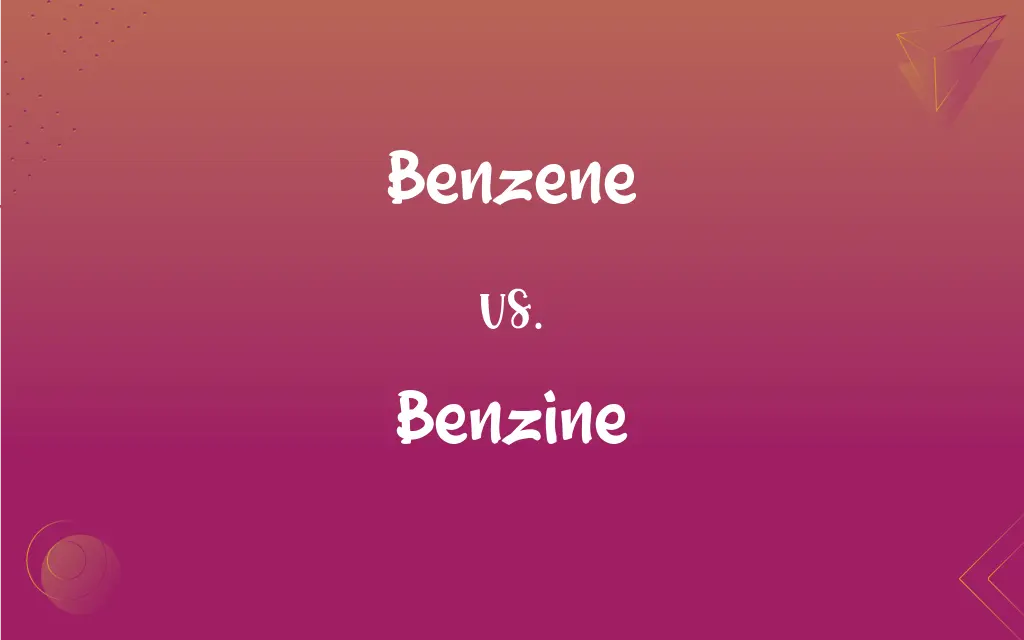Benzene vs. Benzine: What's the Difference?
Edited by Aimie Carlson || By Janet White || Updated on October 7, 2023
"Benzene" is a colorless, aromatic hydrocarbon liquid, while "Benzine" refers to light, flammable petroleum distillates used as solvents.

Key Differences
Benzene and Benzine are terms often mistaken due to their similar sounding names, but they represent different chemicals. Benzene is a specific chemical compound with a ringed structure, commonly used in the production of other chemicals. On the other hand, Benzine isn't a single compound but a mix of hydrocarbons primarily used as solvents or thinners.
When discussing molecular structure, Benzene stands out with its distinct hexagonal ring of carbon atoms, each bonded to a hydrogen atom. This structure makes it a member of the aromatic hydrocarbons group. Meanwhile, Benzine lacks a specific structure as it's a blend of various hydrocarbons, differing based on the particular petroleum distillation process.
In terms of application, Benzene is a foundational compound in the chemical industry, acting as a precursor to the production of several plastics, resins, and synthetic fibers. Conversely, Benzine, due to its solvent properties, finds usage in removing grease or dissolving substances such as paints and varnishes.
Safety concerns arise when handling both substances. Benzene is known to have carcinogenic properties and prolonged exposure is hazardous to health. Benzine can also pose health risks due to its constituents, and both are flammable, necessitating careful handling and storage.
Naming confusion between Benzene and Benzine isn't just linguistic. While both originate from petroleum, their derivation, uses, and hazards are distinct. Therefore, it's essential for professionals and consumers alike to distinguish between them accurately.
ADVERTISEMENT
Comparison Chart
Chemical Nature
Specific aromatic hydrocarbon compound
Blend of light hydrocarbons
Molecular Structure
Hexagonal ring of carbon atoms
Varies due to mix
Primary Use
Production of chemicals, plastics, resins
Solvent for paints, varnishes, and grease removal
Health Concerns
Carcinogenic upon prolonged exposure
Can pose health risks depending on constituents
Origin
Obtained from petroleum and coal
Distilled from petroleum
ADVERTISEMENT
Benzene and Benzine Definitions
Benzene
An aromatic hydrocarbon with a ringed structure.
Benzene is a key ingredient in many chemical productions.
Benzine
A mixture of light hydrocarbons distilled from petroleum.
Benzine is effective in removing stubborn paint.
Benzene
A clear, flammable liquid with a sweet smell.
The distinct smell in the lab was attributed to benzene.
Benzine
Often associated with products like naphtha.
Some refer to benzine as petroleum ether or ligroin.
Benzene
A known carcinogen upon prolonged exposure.
Workers are advised to limit benzene exposure to safeguard health.
Benzine
Flammable and should be handled with care.
Ensure proper ventilation when working with benzine.
Benzene
A compound with the chemical formula C6H6.
Benzene's hexagonal ring structure is iconic in organic chemistry.
Benzine
Lacks a fixed composition, varying by the distillation process.
The constituents of benzine can differ based on its source and processing.
Benzene
Used as a precursor in producing various chemicals.
Benzene is foundational for synthesizing certain plastics.
Benzine
Commonly used as a solvent or thinner.
To dissolve the resin, benzine was added.
Benzene
A colorless, flammable, toxic, liquid aromatic hydrocarbon, C6H6, derived from petroleum and used in or to manufacture a wide variety of chemical products, including DDT, detergents, insecticides, and motor fuels. Also called benzol.
Benzine
See naphtha.
Benzene
(organic compound) An aromatic hydrocarbon of formula C6H6 whose structure consists of a ring of alternate single and double bonds.
Benzine
Benzene
Benzene
Sometimes used in place of the phenyl group.
Benzine
Any flammable petroleum distillate used as a solvent or fuel
Benzene
A volatile, very inflammable liquid, C6H6, contained in the naphtha produced by the destructive distillation of coal, from which it is separated by fractional distillation. The name is sometimes applied also to the impure commercial product or benzole, and also, but rarely, to a similar mixed product of petroleum.
Benzine
A liquid consisting mainly of the lighter and more volatile hydrocarbons of petroleum or kerosene oil, used as a solvent and for cleansing soiled fabrics; - called also petroleum spirit, petroleum benzine. Varieties or similar products are gasoline, naphtha, rhigolene, ligroin, etc.
Benzene
A colorless liquid hydrocarbon; highly inflammable; carcinogenic; the simplest of the aromatic compounds
Benzine
Same as Benzene.
Benzine
A colorless liquid hydrocarbon; highly inflammable; carcinogenic; the simplest of the aromatic compounds
FAQs
Why is benzene considered hazardous?
Benzene is carcinogenic and can pose health risks upon prolonged exposure.
Are "Benzene" and "Benzine" the same?
No, benzene is a specific compound, while benzine is a blend of hydrocarbons.
How can I identify benzene's presence?
Benzene has a distinct sweet smell, but proper chemical tests ensure accurate identification.
Can I use benzine in place of benzene for chemical reactions?
Not typically, as they have distinct chemical natures and uses.
Are there alternatives to benzine for cleaning purposes?
Yes, there are other solvents available depending on the specific application.
Is benzene naturally occurring?
Yes, benzene is found in crude oil, and it's also produced by some natural processes.
Is benzene found in gasoline?
Yes, benzene is a component of gasoline but in regulated amounts due to its hazards.
What's the primary use of benzine?
Benzine is commonly used as a solvent or thinner.
How is benzene typically stored?
In tightly sealed containers, away from flames and in well-ventilated areas.
What products might contain benzene?
Some rubbers, lubricants, dyes, detergents, drugs, and pesticides contain benzene.
Why does benzine's composition vary?
Benzine's composition changes based on the petroleum distillation process.
Is benzine a single compound like benzene?
No, benzine is a mixture of light hydrocarbons.
Why should I be cautious with benzine?
Due to its flammable nature and potential health risks from its constituents.
Can benzine be used for medicinal purposes?
Benzine was historically used for such purposes, but it's not recommended now due to potential risks.
How is benzene produced industrially?
Through refining processes from petroleum and coal.
Does benzene have a distinct molecular structure?
Yes, it has a hexagonal ring of carbon atoms.
What's a notable characteristic of benzene?
Its aromatic nature, which refers to its ringed structure.
Can I use benzine as fuel?
While flammable, benzine isn't typically used as a primary fuel due to its composition.
In what industries is benzine primarily used?
In paint, varnish, and cleaning products due to its solvent properties.
Are benzene and benzine derived from the same sources?
Both can be derived from petroleum, but their extraction and processing differ.
About Author
Written by
Janet WhiteJanet White has been an esteemed writer and blogger for Difference Wiki. Holding a Master's degree in Science and Medical Journalism from the prestigious Boston University, she has consistently demonstrated her expertise and passion for her field. When she's not immersed in her work, Janet relishes her time exercising, delving into a good book, and cherishing moments with friends and family.
Edited by
Aimie CarlsonAimie Carlson, holding a master's degree in English literature, is a fervent English language enthusiast. She lends her writing talents to Difference Wiki, a prominent website that specializes in comparisons, offering readers insightful analyses that both captivate and inform.































































